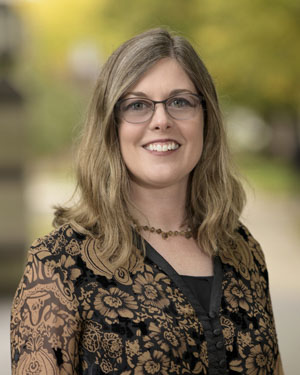Keynote Lecture
Kara D. Federmeier
 Time will tell: What electrophysiology reveals about language comprehension across adulthood
Time will tell: What electrophysiology reveals about language comprehension across adulthood
Saturday, October 8, 2022, 2:00 - 3:00 pm EDT, Regency Ballroom
Chair: Michele T. Diaz, The Pennsylvania State University
Speaker: Kara D. Federmeier, University of Illinois at Urbana-Champaign
Humans have the remarkable ability to link perceptual stimuli with long-term memory – i.e., to glean the meaning of those stimuli – in a manner that is persistent and rapid but also flexible and goal-oriented. Work in my laboratory has revealed that in a relatively invariant time window, uncovered through studies using the N400 component of the event-related potential, incoming sensory information naturally induces a graded landscape of activation across semantic memory, creating what might be called “proto-concepts”. This process of connecting affords the continuous infusion of meaning into human perception. Connecting can be, but is not always, followed by a process of further considering those activations through a set of more attentionally-demanding comprehension mechanisms that permit selection, augmentation, and transformation of the initial semantic representations. The result is a limited set of more stable bindings that can be arranged in time or space, revised as needed, and brought to awareness. The use of these “active” comprehension processes, however, varies across task contexts and across people, including as a function of age, changing how information accrues over time, how context is used to shape word processing, and what people later remember about what they have experienced. Collectively, these findings reveal how the brain uses multiple mechanisms – and takes advantage of time – to provide us with the ability to understand one another and world, across the lifespan.
About Kara D. Federmeier
Kara D. Federmeier, received her Ph.D. in Cognitive Science from the University of California, San Diego. She is a Professor in the Department of Psychology and the Neuroscience Program at the University of Illinois and a full-time faculty member at the Beckman Institute for Advanced Science and Technology, where she co-leads the Illinois Language and Literacy Initiative and heads the Cognition and Brain Lab. She also recently served as the President of the Society for Psychophysiological Research. Her research, supported by the National Institute on Aging, examines meaning comprehension and memory across adulthood, using human electrophysiological techniques in combination with behavioral, eyetracking, and other functional imaging and psychophysiological methods.
